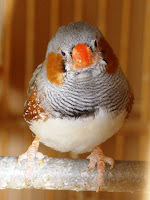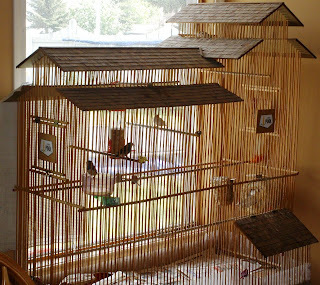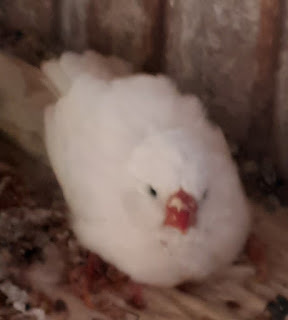Featherheads
From 2015...
 Admit it. He's cute!
Admit it. He's cute!I have birds.
Zebra finches, to be exact. They are easy to take care of, make cute little-bird sounds and are infinitely entertaining to watch.
I love them. It is a love affair that has been going on since 1997.
It all started innocently enough. I was directing a play that required caged birds as part of the premise. A local bird shop loaned us a canary, two doves and a zebra finch.
A cute little finch with a smart polka-dot waistcoat, red cheeks and a black and white striped tail.
During the days, not thinking it wise to leave our little rent-a-birds at the theatre, I brought them home with me.
One day, while I was in the other room, I could hear a cheerful little song. Rising and falling notes that sounded almost as though someone were swinging on a tiny, rusty gate. (A tiny, rusty, musical gate.)
I thought it was the canary, noted for their singing.
Entranced by the sound (and yes, I meant to use the word 'entranced'), I hurried into the room, and stopped beside the canary cage.
The little yellow bird turned and looked at me.
And the little notes kept on.
Could canaries still sing if their beaks were closed?
My knowledge of birds was truly woeful.
I moved to the next cage. Two sweet doves blinked at me sleepily.
The third cage.
And my little maestro was revealed. Singing his little heart out.
My heart was captured.
He was my new - 2 ounce - Jose Carreras.
Later, onstage, when all the other birds were frozen with fear as the spotlights of the theatre shone on them, I heard that same little song.
Miraculously, with people spouting lines and charging back and forth across the stage, my little finch still found the courage to sing.
That was it. I couldn't part with him.
Fortunately, my husband agreed and, at the end of the play, when the other birds were returned to their shop, Peter stayed with me. (Peter finch. Has a sort of ring, don't you think?)
Soon after that, I decided that my little Peter needed a little mate.
And so Polly, she of the beautiful white feathers and similarly striped tail, joined our household.
She and Peter immediately set up housekeeping and a few weeks later, Piggy popped out of the nest. Followed shortly after that by Pepper, Poppy and . . . Percival? Pat? Plethora? Preamble? Pancreas? (I'm ashamed to say I've forgotten his name. I do know it started with a 'P'.)
They quickly outgrew the cage that had seemed so large only a short time ago.
My husband made them a new cage. A large cage in the shape of a grain elevator.
And my birds became a permanent part of our lives.
They are constantly busy. Constantly doing 'birdy' things.
Constantly entertaining.
One can almost hear the conversations as they alternately groom each other, or chase one another madly around the cage.
In all the years of raising them, I have only been able to touch them when they first leave the nest and haven't quite gotten the knack of flying. Even then, I can only touch them for an instant.
I quickly pick them up, band their legs and let them go to become another cute, busy, easily-panicked member of my little finch society.
It's the one thing I wish I could change.
Well, that and the mess of torn newspaper and scattered feathers and seeds that constantly litter the floor beneath and around their cage.
I've tried taking them to task for this, using the same forceful, penetrating words as those I used in raising my children . . . you little monkeys! Clean up this mess!
They never listen.
Wait. Neither did my children! Sigh.
 My private elevator.
My private elevator.Present day...
And now we come to it.
Yesterday, 2 days shy of his fifteenth birthday, my last finch, Whitney, flew home. He's had a rough last six months. He couldn't fly any longer, so I had to put his feed and water on the floor. But he's been happily hopping-and still singing-so all was well.
 Last picture of WhitneyI don't have the heart to start again. So I'm just ending this chapter with these words: Thank you, my little featherheads. I love you so much!
Last picture of WhitneyI don't have the heart to start again. So I'm just ending this chapter with these words: Thank you, my little featherheads. I love you so much!
Published on February 23, 2022 07:16
No comments have been added yet.
On the Border
Stories from the Stringam Family ranches from the 1800's through to today.
Stories from the Stringam Family ranches from the 1800's through to today.
...more
- Diane Stringam Tolley's profile
- 43 followers



